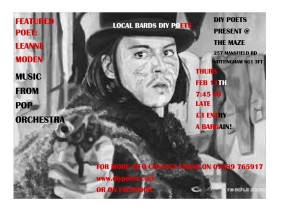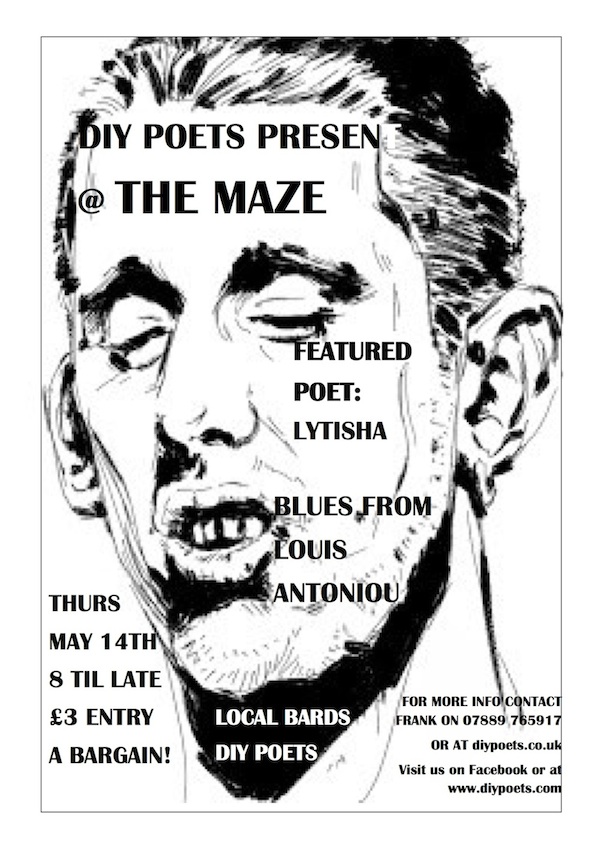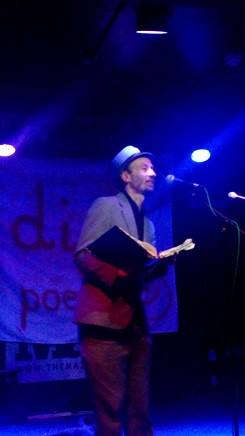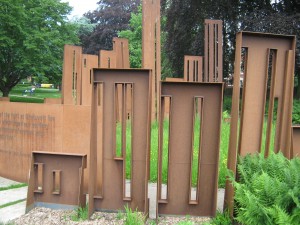DIY POETS Quarterly Gig @ The Maze, Nottingham, Thurs 11th Feb 2016, 7:45
 As featured in today’s Nottingham Evening Post, and fresh from the exertions of Nottingham Poetry Festival, mingling with the likes of Henry Normal and Lemn Sissay, and from jumping on stage to perform at any given opportunity, DIY POETS are back on home turf at the Maze.
As featured in today’s Nottingham Evening Post, and fresh from the exertions of Nottingham Poetry Festival, mingling with the likes of Henry Normal and Lemn Sissay, and from jumping on stage to perform at any given opportunity, DIY POETS are back on home turf at the Maze.
So, to sample some very fine poetry, from a diverse and colourful line up, covering every subject under the sun, from potatoes to Donald Trump, although the difference there is not great, from bass players to unruly technology, from chocolate bunnies to mobile phones, from romance to psychedelia, it’s kaleidoscopic, a sonic tonic for the chronic cynic, and also too for innocent bystanders who only came in for a quiet pint.
Headlining is the metrical maestro, Leanne Moden, who has the knack of pulling you right into her dazzling breeze of words. Don’t miss.
And stay around to check out POP ORCHESTRA, our music act.
DIY POETS at The Maze – May 14th – Spoken Word At It’s Finest!
However many billions UK politicians pledge to put aside to fund the NHS, even when the election is over, it’ll still only cost £3 to see DIY POETS perform at the Maze, and that includes a free copy of the latest magazine! The evening will conclude with live music from Louis Antoniou.
That’s our manifesto, pretty straightforward really.

Performance Poetry Workshop at Nottingham Writers Studio – 9th November 2014
 FRANK MCMAHON REPORTS:
FRANK MCMAHON REPORTS:
Five DIY Poets met on Sunday 9th November 7- 9pm at the Nottingham Writers Studio for an informal poetry performance workshop. The aim was for each poet to increase their skills and confidence when reading/ performing their poetry. Each poet gave a history of their performing their work and how they would like to develop in terms of performing their work. During the session each poet read one of their poems to the group and reflected on how they performed it.
Among the things we discussed were:
1. The importance of a good intro. This is to give a bit of context to a poem, as unlike as when a poem is on the page, the audience have only one chance to hear the poem.
2. Pace of reading. Not to read too fast as this will make it harder for the audience to get the poem and will diminish its impact. A suggestion was to highlight words or phrases that may need to have a pause or emphasised. Consider what words are particularly important. Practice reading the poem and varying the pacing at home.
3. Use of large font and poems to be typed. If the type is large font it is easier to read and the poet can look at the audience more than if they have to strain to read smaller font.
4. Consider the time allocated. Time how long the poem takes reading aloud at home. Do not try to cram too many poems in (I have been a victim of this in the past!). Allow a bit of a break between poems for the audience to process the information.
5. Have the poems in a folder rather than individual bits of paper. It looks more professional and organised and if you are feeling nervous the weight of the folder means the audience will not see any shaking hands.
6. Memorising v not memorising. It’s good to be able to perform the poem without looking constantly at the paper but if too much emphasis is put on memorising the poem this can be counterproductive. If someone turns up without the printed poems they have nothing to fall back on if their mind goes blank. Also, if the emphasis is mostly on just memorising the poem the poet may not be concentrating on other things such as the pace of the poem and where to slow down and put emphasis.
Vintage Poetry: ‘The Owl’ by Edward Thomas – discourse by Frank McMahon

The Owl is a poem written by Edward Thomas, one of the most celebrated of the poets writing about the First World War. Most of his poems are not directly about the trenches but the war features in a more oblique way.
It is a poem about both fulfilment and deprivation, and draws on Thomas’s experience of the front line. It is also a poem about the emotions of empathy and guilt.
The poet is tired, hungry and cold but he will get rest and reach the “sweetest thing under a roof”. His physical discomfort is temporary. The first word of the poem is “downhill”. He has completed the effort of climbing up the hill and things will be easier for him from now on. While the poet recuperates with warmth, rest and food he suddenly hears the owl’s cry, which is explicitly said to be “melancholy” and “no merry note” and penetrates the silence of the night. The owls cry reminds Thomas of the suffering he had undergone when he was on the hills but more so it reminds him of the more permanent greater suffering of those who could not escape. He says that he has “escaped”. The owl’s cry seems to represent his conscience and his capacity for empathy. The owl represents for Thomas “all who lay under the stars, soldiers and poor, unable to rejoice.”
Suddenly his food seems “salted”. This implies that he feels guilty about the suffering that he has escaped and other could not. He suddenly loses in some sense the pleasures of the inn.
I find the poem, which uses simple language, powerful, especially the wonderful metaphor of the sound of the owl in the night.
Frank McMahon
Edward Thomas: the owl.
Downhill I came, hungry, and yet not starved;
Cold, yet had heat within me that was proof
Against the North wind; tired, yet so that rest
Had seemed the sweetest thing under a roof.
Then at the inn I had food, fire, and rest,
Knowing how hungry, cold, and tired was I.
All of the night was quite barred out except
An owl’s cry, a most melancholy cry
Shaken out long and clear upon the hill,
No merry note, nor cause of merriment,
But one telling me plain what I escaped
And others could not, that night, as in I went.
And salted was my food, and my repose,
Salted and sobered, too, by the bird’s voice
Speaking for all who lay under the stars,
Soldiers and poor, unable to rejoice.